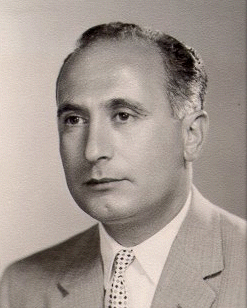
Party of the Iranian Nation is "a small opposition" party in Iran advocating establishment of a secular democracy. Although the party is technically illegal, it still operates inside Iran.

Ehsan Yarshater was an Iranian historian and linguist who specialized in Iranology. He was the founder and director of The Center for Iranian Studies, and Hagop Kevorkian Professor Emeritus of Iranian Studies at Columbia University.
Symphonic music in Iran encompasses Iranian musical pieces composed in the symphonic style. In addition to instrumental compositions, some of Iran's symphonic pieces are based on the country's folk songs, and some are based on poetry of both classical and contemporary Iranian poets.
Professor Mahmoud Behzad, born in Rasht, the capital city of Gilan province, is known as the father of modern biology in Iran. He wrote more than 100 books in Persian and participated in the authorship of more than 200 books in Iran.

Schmidtea is a genus of freshwater triclads. Species of the genus Schmidtea are widely used in regeneration and developmental studies.
Dugesia sicula is a species of dugesiid triclad that lives in freshwater bodies of the Mediterranean Basin, where it is widely distributed. It has been reported from Sicily, Elba and Mallorca, Eivissa, Sardinia, Algeria, Tunisia, Morocco and Crete.
Cura is a genus of freshwater flatworm (triclad)s belonging to the family Dugesiidae.
Spathula is a genus of dugesiid triclad. Its species are found in Australia and New Zealand.
Neppia is a genus of dugesiid triclad that is found in South America, Subantarctic region, Africa, Tasmania and New Zealand.

Ali Ghorbani is an Iranian professional footballer, who plays as a forward for Foolad in the Persian Gulf Pro League. He represents the Azerbaijan national football team.
The first elections for the Senate of Iran were held in two-round system with the primary stage beginning in late August 1949 [Šahrīvar 1328 SH]. The elections aroused little enthusiasm in the country; voting was restricted to the literate citizens. In Tehran, only 15,280 votes were cast.
The elections for the sixth Majlis ended on 27 June 1926.

Seyyed Reżā Zavāreʾi was an Iranian jurist and politician. He served as a member of the Member of Guardian Council from 1995 to 1996, and 1998 to 2004.

Islamic Nations Party or Party of Islamic Nations was an Islamic leftist armed group with clandestine system short-lived during 1960s. It was initially a secret society active against Pahlavi dynasty in late 1950s. It consisted of middle-class youth, mostly highschool teachers and university students.
Society of the Supporters for Progress, Society for the Progress of Iran or Society of the Seekers of Advancement of Iran or simply the Progressives, also known as the Liberals was a political party in constitutional period Persia and was active during the 2nd term of the Majlis, 1909–1911.

Socialism inIran or Iranian socialism is a political ideology that traces its beginnings to the 20th century and encompasses various political parties in the country. Iran experienced a short Third World Socialism period at the zenith of the Tudeh Party after the abdication of Reza Shah and his replacement by his son, Mohammad Reza Pahlavi. After failing to reach power, this form of third world socialism was replaced by Mosaddegh's populist, non-aligned Iranian nationalism of the National Front party as the main anti-monarchy force in Iran, reaching power (1949–1953), and it remained with that strength even in opposition until the rise of Islamism and the Iranian Revolution. The Tudehs have moved towards basic socialist communism since then.

Sayyid Hassan Emami was an Iranian Shia cleric and royalist politician. He worked as a judge in the Ministry of Justice and taught law at University of Tehran.

Soleiman Mirza Eskandari was an Iranian Qajar prince and socialist politician. A civil servant and constitutionalist activist, he served as a member of parliament for four consecutive terms and briefly served as the education minister (maʿāref). During his career, Eskandari was associated with Democrat, Socialist and Tudeh parties. In the aftermath of the Anglo-Soviet invasion of Iran during World War II, the Soviet Union was occupying an area in the north of the country that included the capital of Tehran and took advantage of this position by fostering the creation of the communist Tudeh party under the leadership of Eskandari.










